How to deal with a hyperactive puppy? Puppies have lots of energy and enthusiasm. But at times, their exuberance may seem overwhelming. In such instances, one may be concerned about calming a hyperactive puppy and making things easy for oneself. Do not be anxious – this article will walk you through easy-to-follow and practical ways of controlling your puppy’s energy.
Understanding Puppy Energy Levels
Puppies are still very active. They explore, play, and are generally full of life—that is part of their age! However, there are times when their energy levels are unquestionably overboard. If, for instance, your puppy climbs the walls, it is essential to ask what causes that.
Why Are Puppies Hyperactive?
- Breeds Matter: Energetic breeds can be said to some extent about every breed. For instance, children are full of energy, and Border Collie and Jack Russel Terriers are Predators of Terriers. If your pup is of a very active breed, then a hyperactive puppy is not unexpected.
- Development In A Puppy: As toddlers have moods and episodes, young animals often have mini tornadoes. They are finding their place in the world, and everything around them is exciting. Hence, there are random outbursts of energy or frequent running around.
- Lack Of Exercise: Puppies are very active and need plenty of activities. If such playtime or exercise is lacking, they will make one restless and hyper.
- Boredom: Puppies become bored quite fast. When there are no toys, puzzles, or other activities, they find other means to let their energy out, such as chewing on furniture or chasing tails.
- Lack Of Training: As adorable as these puppies are, there are some boundaries that they ought to learn through proper training. For example, young puppies should know when to rest and when it is appropriate to play. However, they may only have such a correct understanding with proper training.
Comprehending the above makes it easier to know what your puppy wants. Let’s get right to the fixes.
How to Deal with a Hyperactive Puppy
Managing hyperactive puppies can be a test of many attributes, most especially patience. It is all about figuring out what makes them excited and formulating ways of managing and channeling such energy properly. Here is how:
1. Learn Your Dog’s Triggers for Hyperactivity
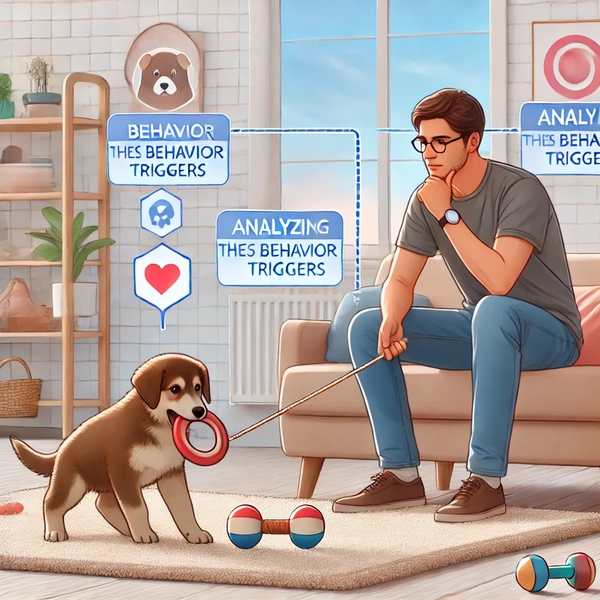
There is always a reason why puppies get hyper— there is always a cause. It may be when they are playing tug, seeing other dogs on a walk, or being left alone at home.
Understanding what causes their hyperactive behavior will assist you in curbing it.
Some of the reasons and triggers include the following:
- Boredom: Puppies will get restless when they have nothing to do.
- Over-stimulation: Quite the opposite of boredom, too much excitement or activity can also overwhelm them.
- Over-tiredness: Puppies, like babies, also get fussy when they need a sleep break.
- Mimicking Your Behavior: If you get too excited, your puppy may do the same.
Knowing what caused the hyperactivity makes solving the problem less complicated. For example, in the case of boredom, you must find an instant solution to occupy the puppy physically and mentally.
Conversely, if the puppy is over-tired, you teach him how to relax and go into rest mode. When they copy how loud and excited you are, try to remain quiet and calm.
2. Avoid Encouraging Excessive Hyper Activity
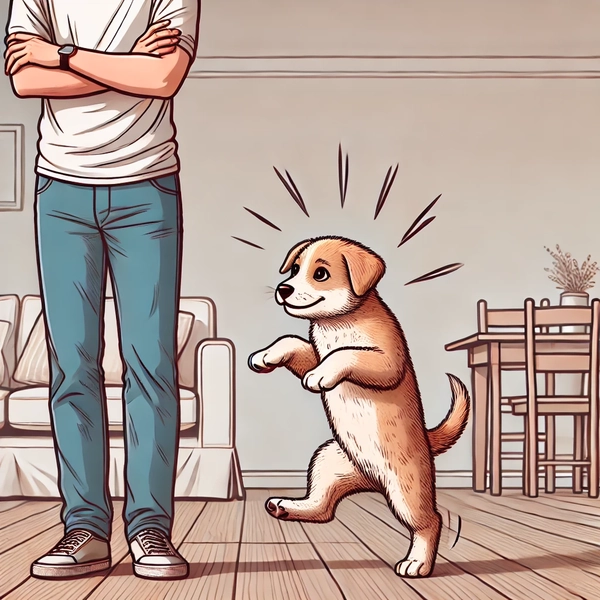
Most of the time, the owners make the mistake of promoting hyperactivity by lavishing attention on the puppies whenever such puppies exhibit outbursts.
In fact, any form of negative attention, such as telling them off or pushing them away, only encourages this behavior.
In such scenarios, do the following:
- As soon as your puppy begins to act hypers, completely ignore them.
- Do not talk, look at, or interact with your puppy. If they are jumping on you or pawing you, simply face away from them.
- If you do not respond, the puppy will learn that solitarily hypers’ behavior does not elicit attention.
Pro Tip: Be real. This simple process may take longer than expected, but your puppy will appreciate the benefits of calmness in the long run.
3. Reinforce Calm Behavior
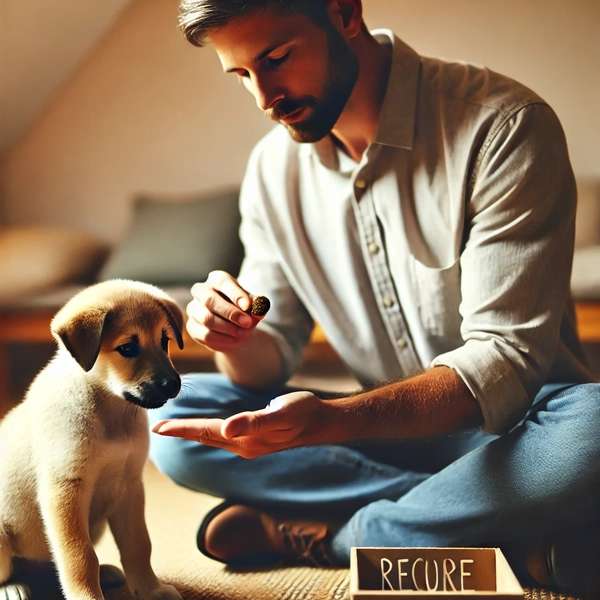
It is important to ignore hyper activities; however, it is equally important to praise your pup when it is at rest. This will help them understand the behavior that is expected of them.
- Instead of using toys, which can be too stimulating, use high-value food treats.
- Try not to overexcite your puppy, and use a calm, relaxed voice to praise. If they pick excitement in your voice, they may get hyper again.
- Stick to a schedule when rewarding, rewarding with treats every time they show calmness.
Reminder: Reward them as soon as they show calmness so as not to confuse them regarding the cause of the reward.
4. Teach the Settling Command
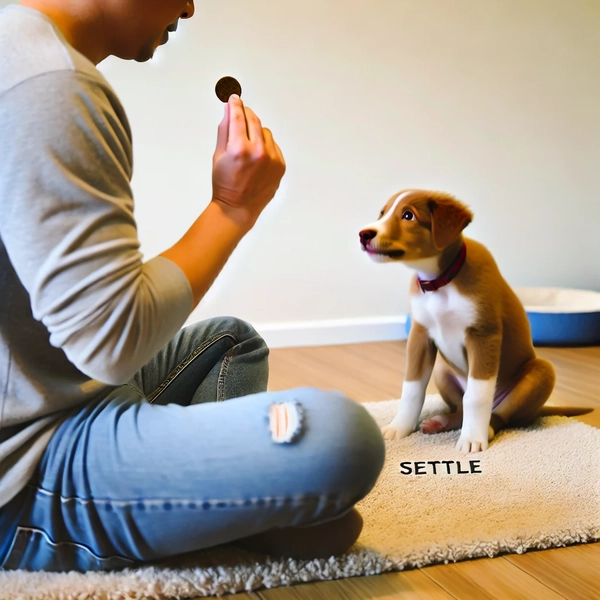
The settling command is another command that will help you deal with hyperactivity in puppies. It takes a while to teach your puppy the word’s meaning, but he will calm down on cue with enough repetition.
In this way:
- When your puppy is made to sit, as a command to be calm, say the word ‘settle’ before any treat is offered.
- If using a clicker, utter the word before clicking and deliver the treat.
- Also, younger siblings will likely master that in a few days rather than almost every other day.
- In addition, level your puppy not only after he becomes hyper and animated but also during his other calm hours of the day.
Tip: Repeating helps a lot, and a puppy will soon learn to ‘tell’ him to be relaxed and ‘settle down’ rather than apes.
5. Use the ‘Settle’ Command When Your Puppy is Hyper
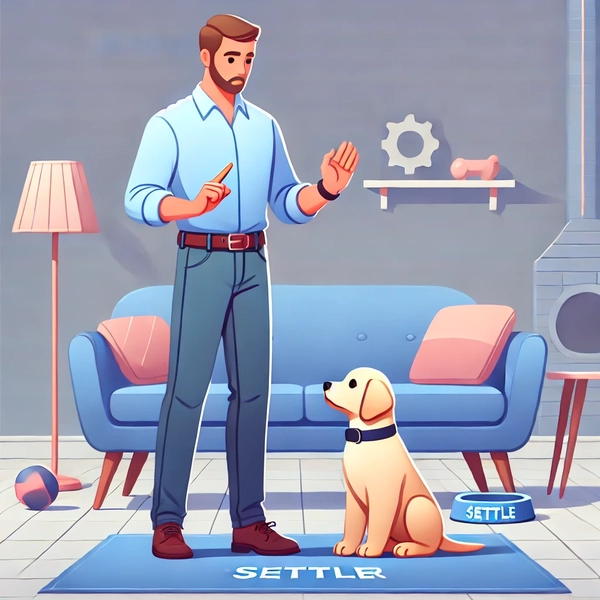
Before using the ‘settle’ command, when your puppy is all fussed up, ensure that your puppy has learned the essence of the command. If it is used before mastering the command, they might disregard you, rendering the command ineffective.
Here’s how to practice:
- Be in a controlled, quiet environment accessible from any distractions.
- Take out a low-value toy your puppy usually does not desire and use it to engage your puppy for a minute or two.
- After ensuring your puppy is too aroused, stop the interaction and give “settle.”
- Allow your puppy to calm down. This will take a while initially, so be prepared.
- After they settle, tell them nice things and give them a treat.
As time goes by, your puppy should have an easier time settling, after which you can attempt the command in various locations with more distractions.
Increase the difficulty level, but remember to praise them for obeying. The objective is for your puppy to understand that downtime is more appreciated than running around.
6. Allow Your Puppy Some Time to Settle Down

Hyperactivity is sometimes just a growth stage, and many puppies will developmentally outgrow such behavior.
This can take anywhere between weeks, months, or, in most cases, even longer, depending on the disposition regarding their behavioral control.
Consistently ignoring hyperactivity and then giving praise for calm behavior will teach your puppy that they receive treats and praise for calmness. After some time, they will choose calmness more often.
Note: Be determined and orderly, for every puppy grows differently.
What If My Puppy Still Won’t Calm Down?
Keep going if you have attempted everything and your puppy is still bouncing off the ceilings! Here are a few more suggestions:
1. Check Their Nutrition
Diet has a significant impact on a puppy’s energy levels. Ensure you provide them with premium puppy foods and eliminate over-sugared and artificially enhanced foods. Such foods incite hyperactivity in puppies.
2. Investigate Other Causes
In some cases, hyperactivity is indicative of some other medical condition. It is advisable to see a veterinarian when a puppy is chronically agitated. They may exclude conditions such as getting affected by potentially harmful foreign agents or gastrointestinal disorders.
3. Be Calm and Keep Trying
Learning takes time for puppies. Be calm and carry on the same habitual itinerary. Remember the principal rule! This puppy will, with time, begin undertaking and grasping the expectations, thereby settling down.
When to Seek Help
There are puppies that are hyperactive, and that is somewhat okay, but if your puppy’s activity is too much, it’s probably high time you found someone who has the needed skills.
1. Professional Trainer
If training at home doesn’t seem to work, it is appropriate to seek the services of a trainer. Such an individual would provide some additional methods for working with the puppy.
2. Doggy Daycare
Doggy daycare can be another good idea when you are busy most days. It allows your puppy to interact with other dogs and use up some energy within them.
Summary
It’s not easy to handle an overly active puppy, but finding ways to make them happy and shed out the excess energy is possible. Here’s a summary:
- Exercise: Go for a walk daily, play fetch, shoot an obstacle course.
- Mental Stimulation: Solve puzzle toys, enroll in training, or do some hide and seek.
- Routine: Create a timetable for playtime, mealtimes, and sleeping hours.
- Training: Apply positive reinforcement when teaching the puppy to be still.
- Calm Environment: Create a place away from noise, and do not over-excite the puppy.
The other point is that your puppy will understand the difference between playtime and downtime. Patience is encouraged as the stage differs from one puppy to another. Soon enough, an excitable puppy shall calm down and remain the best companion ever.